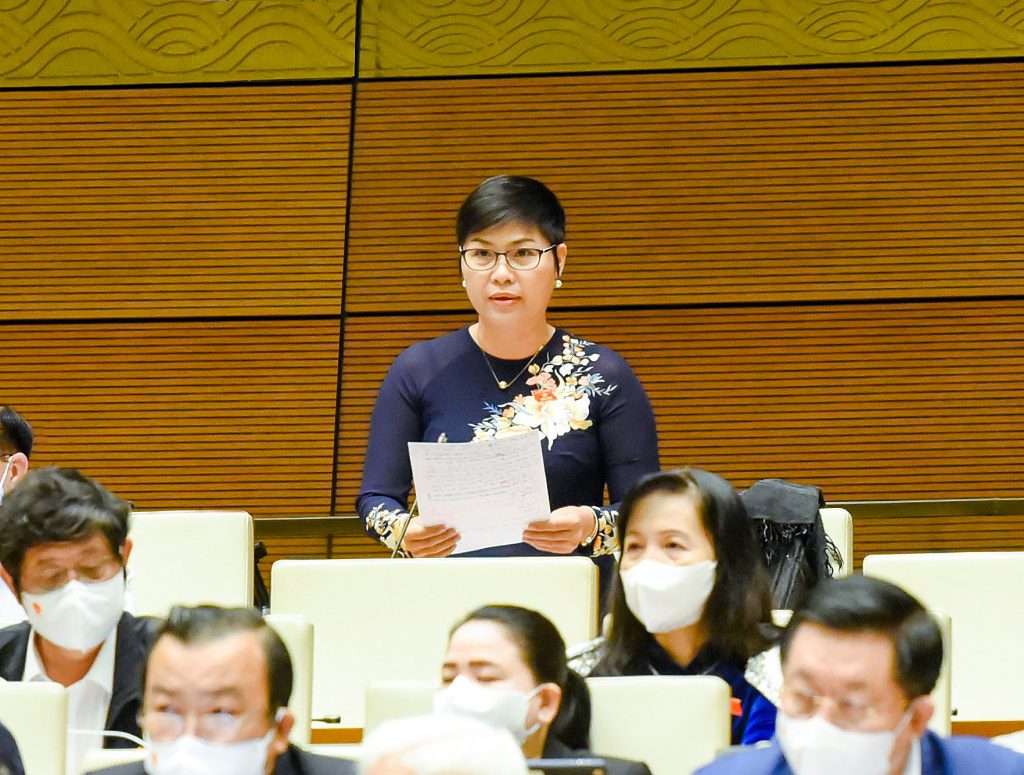“Increasing the rate of budget allocation at a reasonable level for Dong Nai, Binh Duong and Ho Chi Minh City so that these localities have more resources for post-Covid recovery.”
That is the proposal of National Assembly Delegate Do Thi Thu Hang (Delegation of the National Assembly of Dong Nai province) at the November 8, 2021 afternoon session of the 15th National Assembly.
Discussing the implementation of the State budget plan for in 2021, the State budget estimates, the scheme for allocation of central budget for 2022 and the 3-year State budget-financial plan (2022-2024), delegate Do Thi Thu Hang put forth a remarkable proposal which is to consider increasing the rate of budget allocation for Dong Nai, Binh Duong, and Ho Chi Minh City in 2022 and beyond. This will, she said, provide these localities with resources for economic recovery given the fact that these are the cities and provinces worst hit by Covid and that these are also the key provinces for industrial park development with the highest labor productivity and great contributions to the country’s economy and budget.

National Assembly delegate Do Thi Thu Hang (Dong Nai) speaks at the afternoon working session on November 8, 2021
Elaborating on this proposal, Hang stated: “Over the past 6 months, the Covid “storm” has broken out for the fourth time and caused unprecedented challenges for the country. The southern key economic region, which is home to the country’s major economic and industrial centers, has been the worst hit region. The impacts of Covid are well reflected by the economic performance of HCM City, Dong Nai, Binh Duong, Long An and other provinces”.
The delegate added: In the first 9 months of 2021, HCMC’s GRDP decreased by 4.98% and total retail sales of goods decreased by 17.4% over the same period while in Dong Nai and Binh Duong, most economic indicators showed slow growth. Specifically, in Dong Nai, the total retail sales of goods and services increased by only 1.12% and the industrial production index only increased by 2.91% over the same period (while the national average increased by 4.5%). This is also the lowest growth rate in many years; domestic investment capital is only 52% over the same period; nearly 900 enterprises have had to suspend operations and dissolve. Up to now, Dong Nai has spent more than VND 6,000 billion VND on Covid control efforts. In Binh Duong, the total retail sales of goods and services only increased by 1.9% and the index of industrial production only increased by 2.9% over the same period; 435 enterprises have downsized capital and dissolved. It is forecast that Dong Nai, Binh Duong and Ho Chi Minh City will not achieve the GRDP plan for 2021. Besides, millions of workers have left Ho Chi Minh City, Dong Nai, Binh Duong, and Long An and this has caused a shortage of labor.
In addition to economic losses, delegate Do Thi Thu Hang said that these provinces have suffered heavy damage in terms of people’s physical and mental health as well as the local brand. “These provinces are like people just having experienced a severe illness with a “high fever” that lasted several months and they are now in need of relief resources that could help them gradually recover”, Hang said.
Through practical observation and assessment, Hang remarked that the Covid has created great challenges and pressure on the State budget plan for the 2022-2024 period. However, allocating the national budget in an appropriate manner with increased shares for provinces worst hit by Covid such as Dong Nai, Binh Duong, and HCMC is very necessary.
“With increased budget allocations, these provinces will have resources to recover and invest in infrastructure, especially transport and health infrastructure, to improve competitiveness, increase resilience in the context of the unpredictable pandemic and at the same time pro-actively respond to other impacts. This initiative together with the effective implementation of existing support policies and the stimulus packages already in place will help the key economic areas recover economically, create far-reaching effects and entail growth for the Southern dynamic economic region as well as the whole country. In addition, these provinces will have additional resources to develop the digital economy, increase investment in inter-regional connectivity infrastructure, ensure social security and people’s lives and, especially, create a fulcrum for millions of migrant workers”, Hang emphasized.
The delegate also said that one of the post-Covid goals of Ho Chi Minh City, Dong Nai and Binh Duong is to urgently build social housing for workers and low-incomers. Ho Chi Minh City plans to develop 1 million low-cost houses, Dong Nai strives to build about 6,000 social housing houses in the period 2021 – 2030, and Binh Duong is expected to increase about 2 million m2 of floor space. social housing and resettlement housing in the period of 2021 – 2025.
“Conclusion of the Fourth Conference of the 13th Central Committee of the Communist Party of Vietnam has set out important goals in 2022, including the goal of “Safely and flexibly adapt, effectively Covid, promote socio-economic recovery and development, not undermine long-term growth drivers”, at the same time in the context of possible prolonged Covid, allow determination of the rate of allocation and additions to local budgets. Together with this policy, we expect and believe that the National Assembly and the Government will wisely make the most appropriate decisions, creating a premise for rapid recovery and development both local and nationally”, Hang said.
(According to Business Forum Magazine: https://diendandoanhnghiep.vn/dai-bieu-quoc-hoi-de-xuat-tang-ty-le-dieu-tiet-ngan-sach-cho-dong-nai-binh-duong-va-tp-ho-chi-minh-210425.html)
